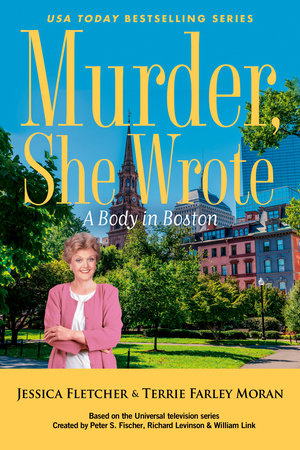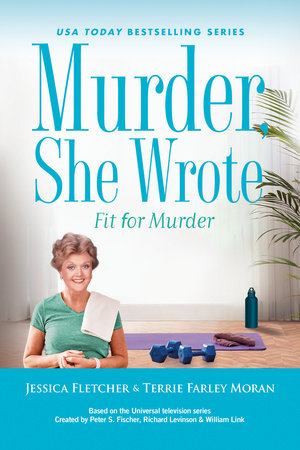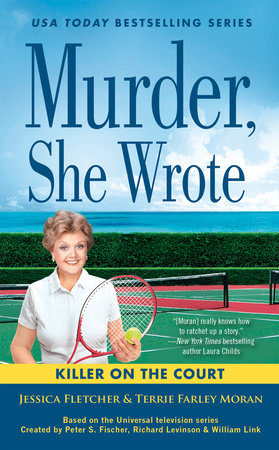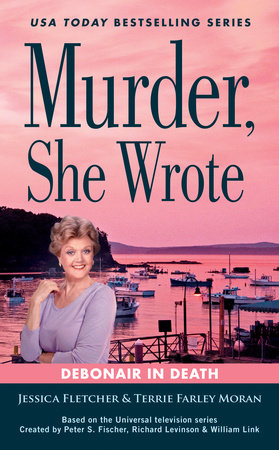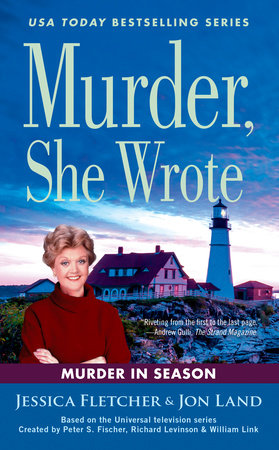Excerpt
Murder, She Wrote: Snowy with a Chance of Murder
Chapter One
I stared at the luggage lying open on my bed and pondered what I might have to remove if I was to have any hope of closing them. The multiple evening gowns strapped into my garment bag seemed excessive, especially since cruises had become more casual of late, but the Mystery Lovers Cruise always included a formal dinner, which I'd agreed to keynote this year.
And if this cruise had a captain's table, well, I was considered enough of a celebrity to receive an obligatory invitation. The more noteworthy celebrities at the table would ask me a polite question or two about my books. Then I'd sit quietly, eating my dinner, sipping my tea, and nodding occasionally while they told exaggerated stories of their own exploits, trying to one-up the others. Not that I would mind. I'm an excellent listener, and I've gleaned a few good plot ideas from such dinners. Minor celebrities with overinflated senses of self-importance always make such excellent murder victims. Fictionally speaking, that is.
For author presentations, of course, wearing one of my tailored jackets always bolsters my confidence. To save space in my luggage, not to mention my stateroom, I deviated from my well-used packing list and paired the blazers with colorful sleeveless dresses that I could also wear alone while relaxing on the deck with a good book, soaking up the sun and the sea breezes, or, during our stops, meandering through streets lined with quaint shops and open-air markets. But accessories soon ate up that freed space: scarves, belts, brooches, earrings, necklaces, hats, sunglasses, and-oh, I needed my navy pumps and a bag to match. I headed back into my walk-in closet.
After several trips down the stairs, my well-traveled burgundy luggage stood in a neat formation just inside my front door, and I peeked to see if my taxi had arrived. I stifled a sigh when I noticed that the stiff wind coming off the coast had drifted some of the shoveled snow back onto my steps and front walk. Yes, agreeing to go on a cruise in the February of a particularly snowy Maine winter had been a wise decision, and I was also looking forward to the two days of pre-cruise relaxation that Susan Shevlin had talked me into when booking my trip. "You don't want to cut it too tightly," she'd advised, drawing on her years of experience as Cabot Cove's best travel agent. "One canceled flight or missed connection and you could miss the cruise. And I know of a lovely resort not far from the port . . ." Although part of me would miss the brisk New England air, my blazing fireplace, and my cozy cardigans, getting out of Cabot Cove and into some tropical sunshine would surely boost my spirits, not to mention my vitamin D.
The taxi pulled up and I grabbed the largest of my bags, knowing that Demetri, my driver and longtime friend, would see me struggle with it and come to my aid. I waved as the door of the blue Subaru Forester popped open, and I took a step forward.
My foot failed to find solid purchase and instead slid hard to the right. I shifted my weight to the other foot, but not before my right ankle and knee bent awkwardly, and then the other twisted, and then gravity-assisted by the added weight of my luggage-pulled the rest of me down, driving my hip, then elbow, then head into the concrete steps. I slid down, my head jarred as it made contact with each new step, and then everything went black.
"Mrs. Fletcher! Mrs. Fletcher!" Demetri shook my shoulder a moment later. At least I thought it was only a moment later. I raised my eyelids, and the world went from all black to a dismal gray circle broken only by Demetri's blurry face hovering over me. "It's all right, Mrs. Fletcher. I called an ambulance. It'll be here soon." He squeezed my hand with his gloved one.
Squeezing back was the only motion I dared to attempt, my hazy brain starting to receive mingled messages of pain and cold from the rest of my body. "Thank you, Demetri."
No captain's table for me, I thought, and then I closed my eyes again.
I remembered bits of the ambulance ride, then the fluorescent ceiling lights speeding by during the quick gurney ride down the hospital corridor. As the fog began to lift from my brain, I determined that the lights had probably been switched to LEDs a long time ago to save money. An insignificant detail to some, but as a writer, I’ve learned I have to get such minutiae right or I will hear about it.
Then came hours of waiting, assessment by various specialists, X-rays, MRIs, more assessment, more waiting, and then finally a nurse wheeled me into a private room at Cabot Cove Hospital. The pain had thankfully subsided, but I suspected that had to do with one of the beeping machines at the side of my bed.
Seth Hazlitt, squinting at my chart on his tablet, strode through the door soon after my arrival. Seth had trained in the era of clipboards and paper charts, and the tablet seemed almost anachronistic in his hand, but the familiar bow tie and lab coat were comforting. Also unchanged were his close-clipped white hair and the glasses perched on his broad face. And his expression of concern.
"I have good news and bad news, Jess. More good than bad. That spill could have been a lot worse. All that bike riding and walking have paid off. No broken bones."
"That's a relief." I tried to shift in my bed a little, but pain shot through my arm.
Seth rushed over and adjusted my bed upward. "Better?"
I nodded, then gingerly sipped water from the cup a nurse had left on my tray table.
Seth waited until I finished. "Then there's the bad news. You managed to sprain both ankles badly on the way down, subluxated your patella-it's back in place, but we'll want to brace it."
"So you're telling me I'll be on crutches for a while?"
Seth shook his head. "I wasn't done yet. You also sprained your right wrist, probably trying to catch yourself midfall. And then there's the matter of the mild concussion caused by your head hitting the steps. I think we can avoid surgery, but it's going to be several weeks in a wheelchair while we keep those joints immobilized so they can heal. Then you'll need some physical therapy. It might be easier if we keep you in the new rehab wing. They're all private rooms, a nice view overlooking the woods. I brought you the brochure to-"
"Absolutely not!" I took what I hoped would be a calming breath. "I'll be perfectly fine in my own home."
Seth sank into my visitor's chair. "Somehow, woman, I knew you were going to say that."
"Seth, you know how much more comfortable I'll be in familiar surroundings. And working on my next book will make the recovery time go by so much faster." When his face remained skeptical, I added, "As you always say, hospitals are great places to be sick and bad places to get well. You could come by and check on me."
Seth wiped his face with both hands and remained silent for a good minute. "We could send you home tomorrow. I still want to keep you at least overnight, to watch that concussion. But there will be conditions," he added as he wagged a finger at me.
"What conditions?"
"First, we'll get that wheelchair for you."
I thought of my house, and the steps down from the raised entryway to my living area-and my bedroom and all my clothes on the second floor. I supposed I could make do for a little while.
"Second, you're going to need someone with you. Twenty-four seven."
"Well, maybe Grady, but I'd hate to impose . . ."
"I know you would," Seth said. "Jess, what about a home care aide? There's one I've worked with a few times. Name's Alice Myers. She could help you with daily tasks, even make sure you do any exercises your PT recommends."
"A stranger?"
"Oh, I think you'd like her. Intelligent. Well-mannered. In fact, she told me once that she, uh . . ." Seth scratched the white stubble on his chin.
"She, uh, what?" I asked.
"That she wanted to be a writer. So you'll have plenty in common to talk about."
"Seth, you can't saddle me with a wannabe writer as a houseguest for what might be weeks."
"Aide, not guest. I honestly thought you'd be thrilled. You're always teaching classes and mentoring other writers at all those conferences you attend. I seem to remember someone telling me, We repay the good things in our lives by investing in someone else."
"Yes, I still believe that, and many aspiring writers are perfectly lovely people. Some are too shy to hazard a question. Then there are others . . ." I took another sip of my water and used the time to contemplate how to frame my next words. I decided to go for the blunt truth. "Then there are the flypaper and the frustrated."
Seth's eyebrows shot up to his hairline.
"The flypaper have concluded that I, and I alone, hold the key to their finally getting published. At first it's flattering-they fawn at my every word-but then they're everywhere: seated next to me at dinner, lurking in the back of every elevator I get into, and trying to engage me in conversation through the bathroom stall door." I shivered.
"Alice isn't anything like that."
"But then there's the frustrated. Rejection is inevitable in the publishing industry. After a while, you learn to take it on the chin, but there are some who can't fathom why my 'drivel' gets published and their 'masterpiece' doesn't. They want to argue my choice of villain in The Dead Man Sang, or point out the typo on page seventy-three of The Umbrella Murders. Seth, I've had a few encounters that had me looking around for security."
A machine next to my bed beeped out a warning.
"What's that?" I asked.
"Your blood pressure just went up," Seth said with a half smile. He rose, stood beside me, and patted my hand. "Jess, I assure you Alice doesn't seem like either of those things. Tell you what, I will stop by to check on you as often as I can, and if you two don't get along, we'll find someone else. Deal?"
I sent him my most skeptical look. I've always valued my independence, and I supposed the necessity of a home care aide upset me more than Seth's choice of one did.
"Or there's always the rehab wing," he said airily.
I managed to cross my arms stubbornly, but the pain must have shown on my face.
"That's what I thought," Seth said. "I'll set it up."
A nurse found my cell phone, thankfully undamaged, among the contents of my purse, which had been stuffed into a plastic bag with my name on it and shoved into a locker. I spent the remaining daylight hours contacting people and informing them about my fall.
The cruise organizer proved very understanding, telling me to focus on taking care of myself and that she was certain she could find a last-minute replacement. Twenty minutes later, she sent out an email announcing that my friend Lorna Winters would be joining them this year. I chuckled at the thought. I'd recently substituted for Lorna at an event in Ireland after she'd badly fractured her leg. It's funny sometimes how things turn around.
I called the property management service that I had recently hired to take care of my house when I traveled, and I left a voicemail message letting them know they needn't let themselves in to water the plants, turn on the taps to keep the pipes from freezing, and do everything else they promised when pitching their services. Seth had grumbled that he was perfectly fine watching over things while I "gallivanted about," as he put it, but with the amount of traveling that I sometimes did, relying on him and my neighbor Maeve seemed like such an imposition. When my regular snow-removal guy, Mr. Gunderson, informed me that he was signing a contract to remove snow exclusively for Redfern Property Management, I signed on the dotted line too.
I tried my friend George Sutherland next but got only his voicemail. I left what I hoped was an upbeat message, explaining my change in plans.
I video chatted with my nephew Grady, who threatened to drive up immediately from New York, but I assured him I was being well taken care of-especially since he was still in his pajamas and sounded congested.
"Are you sure, Aunt Jess?"
"I am," I said, also remembering how he'd cared for me when I threw out my back during Hurricane Ida. He'd lovingly prepared tuna omelets, tuna surprise, tuna casserole, and tuna potpie. The last one I pawned off on poor Amos Tupper, who was still sheriff back then, but the mere thought of it made me shudder. "But how are you?"
He stopped to cough before answering. "You know how it is when you have a kid in school. They bring home everything. We've all got it now. It's probably better that we keep our germs at home."
"Well, give Donna and Frank my love."
"I can do better than that! Say hi to Aunt Jess!" He swung the phone around to face the couch, where Frank sat reading a graphic novel and Donna huddled in a blanket, dabbing tissues against her red nose. She tried to sit up straighter and wave.
"Hi, Aunt Jess!" Frank said, hamming for the camera. Truth be told, since his parents had named him after my late husband, I often still thought of him as Little Frank, even though he was now almost eleven and considered himself quite grown-up. "I overheard you tell Dad about your accident. I'll make you a card."
"Thank you, Frank," I said. "That would be lovely. I'll send you one too."
Frank shrugged. "It's just a cold."
A polite knock on my doorframe interrupted my call, not that the last nurse to check my blood pressure hadn't left the door wide open. A man in a white coat pushed a wheelchair into the room. Although his crop of curly brown hair was receding, he seemed young. Brown eyes matched the brown rectangular glasses that tried to hide them. "I have your loaner chair, Mrs. Fletcher."
Frank jumped up from the sofa. "A wheelchair? Wicked. Can I see it?"
"My nephew's boy wants to see it," I explained to the man, and swung the phone's camera in his direction. He stretched out his arms as if he were showing off the grand prize in a game show.




